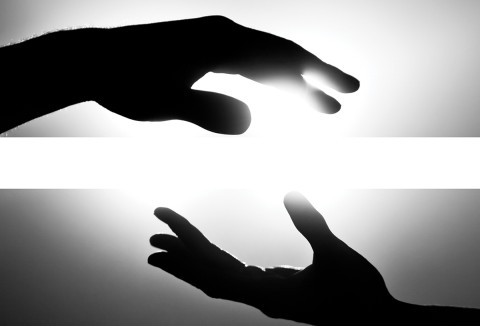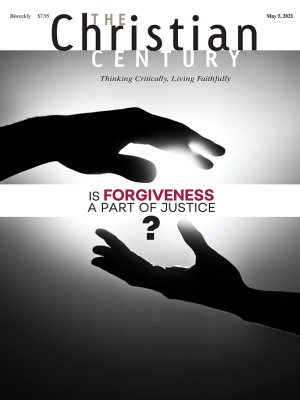Christian peacemaking and the role of forgiveness
Seeking justice is critical. Is it enough?

As I have watched the political skies shift since the election, I’ve had the nagging feeling that there is something that Christians are not saying, or not saying loudly enough. We affirm and proclaim the importance of justice, but are we falling short of our full witness?
Christians engaged in justice work must first and foremost be peacemakers. But Christian peacemaking begins with forgiveness. Forgiveness is essential to being the church, being in the world but not of it. It is also essential that we bring this witness to the public sphere. Justice seeking alone, without a Christian orientation to peacemaking, will not be sufficient.
Read our latest issue or browse back issues.
But before forgiveness can do its peacemaking work, it must first be rescued from definitions that make it irrelevant.
There is a passage in Between the World and Me where Ta-Nehisi Coates remembers the funeral of his classmate Prince Jones, who was killed by a police officer. Sitting in Rankin Chapel on the campus of Howard University, under the stained-glass gaze of former dean Howard Thurman, Coates confesses, “I have always felt great distance from the grieving rituals of my people.”
Coates attributes his inability to connect with Christian grieving rituals to his rejection of Christian understandings of forgiveness. Forgiveness is not something he is able to offer, so he feels that he stands apart from what is happening in that chapel. “The need to forgive the officer [who killed Prince] would not have moved me,” he writes. “I knew that Prince was not killed by a single officer so much as he was murdered by his country and all the fears that have marked it from birth.”
For Coates, this makes forgiveness of the killer “irrelevant.” Nor can he bring himself to ascribe any higher purpose to Prince’s death. He can mourn, yes, but not with trust that Prince’s death served some yet-to-be-seen purpose. Forgiveness and purpose are two things he attributes to Christian grief, on display in the chapel, and he rejects both.
Coates’s description of his thoughts and experiences in that chapel moved me, in part because I too have met my limit for understanding and acceptance at the funerals of two men whose murders came at the hands of this country’s beliefs and fears. My friends Derek and Wayne were killed by the same system that produced the police officer who killed Prince. Derek Jackson was killed by a drug addict. Wayne Simpson was shot outside his father’s ice cream shop. While neither was killed by a police officer, both were killed by a system that puts Black bodies at risk and weaponizes their very existence.
A few years before Between the World and Me came out, Coates expressed his problem with ultimate purpose in an essay in the Atlantic. “I don’t believe the arc of the universe bends towards justice,” he wrote. “I don’t even believe in an arc. I believe in chaos.” If anything good will be done, he argued, it will be done by humans. “I think that those of us who reject divinity, who understand that there is no order, there is no arc, that we are night travelers on a great tundra, that stars can’t guide us, will understand that the only work that will matter, will be the work done by us.”
Forgiveness, as Coates understood it in the chapel, is irrelevant because it appears as an isolated incident in a universe that moves toward chaos, not justice. If by forgiveness we mean that we initiate some action in our own hearts to forget what this country has done to Black bodies and why, then I agree with Coates: such forgiveness is meaningless.
But unlike Coates, I do not reject the notion of a Christian God. Indeed I believe that the church has something of radical significance to offer amid the circumstances in which we find ourselves, amid the continual mourning for Black people killed by systems of violence. From my perspective, Coates’s particular brand of atheism does not allow us to be as radical as we need to be in addressing the violence and death that are too much a part of American society.
What transforms the Christian understanding of forgiveness is its role in the larger and more significant project of peacemaking. With the help of Stanley Hauerwas, I learned that Coates’s rejection of forgiveness as a viable social ethic is actually shared by some Christians. In a 1985 essay for the journal The Furrow titled “Peacemaking: The Virtue of the Church,” Hauerwas writes that Christians have frequently dismissed Jesus’ account of forgiveness in Matthew 18:15–20, either because they find it impractical or because they believe that “we are better off waiting for some conflicts to die through the passage of time.” Forgiveness, so understood, might be perceived as meaningless.
But Hauerwas argues that a robust form of forgiveness as a Christian practice presupposes that “peacemaking is that quality of life and practices engendered by a community that knows it lives as a forgiven people.” It occurred to me that this is what Coates missed as he sat alienated in Rankin Chapel. Jones’s mother and others grieving with her were doing so not only as Black people but also as people who are forgiven.
Christianity is a religion rooted in historical claims about Jesus’ life, death, and resurrection. Therefore, Christian peacemakers cannot deny history or forget it. Specifically, they cannot forget the history that sends police “into ghettos armed with the same self-generated fears that compelled the people who think they are white to flee the cities and into the Dream,” as Coates writes. This history and its deepest realities are at the center of Christian peacemaking. Peace can only come with a true accounting of history.
Forgiveness, in a Christian account, is one of the ways that Christians enter into engagement—one might even say conflict—with their enemies. Nonviolent protests are an excellent example of this engagement. This conflict is not an attempt to annihilate the enemy. That too would be a form of forgetting. Forgiveness is not a denial of history: it looks directly at the need for forgiveness and engages directly those who have committed and perpetuated social, political, systemic, and personal evils. In Christian peacemaking, the offering of forgiveness is also an indictment. For example, it exposes the lies inherent in the deaths of Jones, Jackson, and Simpson. They were not killed, as the lies go, because police officers were keeping the peace, or because addiction is a form of moral failure, or because putting Black people behind bars makes us safe.
The Christian practice of peacemaking makes clear that an egregious sin has been committed—not only against one individual but also against Black people as a community and against the social fabric itself. Forgiveness makes these sins visible.
Christian peacemaking asserts that these crimes are not how things should be. They are not “natural.” They are outside the realm of peace that God showed us through the life, death, and resurrection of Jesus Christ. Christians use forgiveness to assert the power and possibility of another way of being in relation with one another—one that has redemption and reconciliation at its root. Christian forgiveness exposes as unnatural the murders of Jones, Jackson, and Simpson as well as the history, beliefs, and fears that ultimately formed their killers. It provides an alternative account of human relation.
Forgiveness, in this sense, is not irrelevant; it is a means of revelation. Coates’s assertion of the meaninglessness of Jones’s death is not as powerful a statement. At the same time, a Christian account of forgiveness can join with Coates’s own in exposing the absurdity of the circumstances that led him to believe that Prince’s death was meaningless.
Once we have acknowledged the true nature of the crime that has been committed, once we have not only made that crime visible but also named it as unnatural, our understanding of peacemaking shifts from the work of potentially heroic individuals to the work of ordinary humans who are themselves forgiven. When the ordinary people in Rankin Chapel evoked forgiveness, they were not talking about their emotions in relation to what happened to Jones or their decision not to remember it. They were acknowledging that the social fabric is in a state of disrepair, that humans are wounded and broken as well as blind. The powerful proclamation of Christian peacemaking is that we do more than recognize our common brokenness. We expose brokenness as contrary to the condition of humanity, and we work to witness to the true condition.
This makes sense to a people whose redemption and salvation are not an idea but a person. Thus the enemy is invited into the work of peace as a friend who is also forgiven. Christians are able to love our enemy in this way because our enemy does not define us. We are both defined by God.
Furthermore, a forgiven people understands that they cannot heal history all on their own. We can’t make it right. Coates says he believes that the only work that matters will be the work that humans do, but as a forgiven people, we know that we do not have it within ourselves to make everything turn out all right. We do not conceive of history as a human achievement; we submit to the notion that we are not only divinely contingent and determined but also known and loved.
This offers hope, and it is perhaps the best reason that Christian peacemaking principles need more room on the public stage, especially in our current climate. Christian forgiveness as a social ethic offers something that society cannot get without the witness of the church. You do not necessarily need the church or religion to participate in acts of justice. An appeal to the rule of law and the language of individual rights may be enough to move the needle of the American democratic republic toward a more just society. It cannot, however, move the needle toward a more beloved one.
A people consecrated to the work of peacemaking lives into the answer that is beyond human achievement. The practice of Christian forgiveness by a forgiven people offers a distinctive witness the world cannot do without.
A version of this article appears in the print edition under the title “Forgiveness that matters.”





